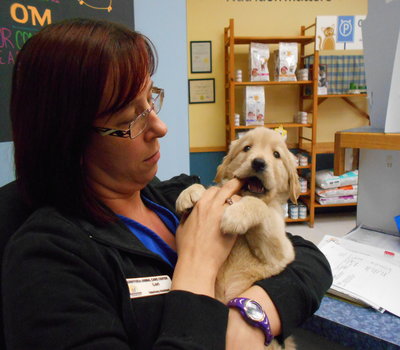Puppies can carry intestinal or skin parasites that may not be apparent to their owners. Unfortunately, intestinal parasites have a potential to affect other family members, in addition to some skin parasites! We include monthly deworming for all our puppies, based on fecal test results.
In general, for internal parasite control – your puppy should receive oral deworming at; 8, 12, and 16 weeks at a minimum with monthly deworming to be considered based on lifestyle. Where external parasites are concerned, Sunnyview Animal Care recommends a similar skin parasite prevention schedule.
ROUNDWORM
One of the more common parasites found in dogs, Roundworm infestation can be a symptom-free although some puppies develop diarrhea & vomiting. Roundworm prevention is an important consideration for your family as, one of the two common dog species of roundworm may infect people! Contaminated feces left outside for more than 30 days will become infectious to other animals & people, however puppies usually become infected from nursing an infected mother or, during embryonic development. Adult dogs can become infested with roundworm by consuming an animal carrying developing roundworm when roaming our yards or on hikes.
HOOKWORM
Hookworms are one of the more prevalent intestinal parasites in our area-& suck blood from our pets and, infect people! Hookworm larvae can penetrate the skin directly through the feet or any other part of skin touching the ground due to contaminated feces left outside. Puppies typically become infested with hookworms through nursing or, by ingesting hookworm larvae in the mother’s nest/environment.
Unfortunately, many other mammals, insects (such as cockroaches!), & birds can pick up hookworm larvae from the soil-therefore a pet is 10 infected rodents or birds will become infected very similarly to those that come in contact with hookworm infested soil. Soil contaminated by whipworm eggs is contaminated for years, and is virtually impossible to remove eggs from the soil or kill them.
Dogs may become chronically re-infected once hookworm is brought into your home environment!
WHIPWORM
Similar to roundworm, Whipworm spreads when our pets lick or ingest ground, groom themselves or other pets that have already been infested with roundworm eggs. Contaminated feces left outside for more than 30 days become infectious to other animals-however it is not considered to be a significant risk for people.
TAPEWORM
There are many species of Tapeworm that can infest our dogs & puppies, and tapeworms are easily spread out amongst dogs or cats that are involved in hunting or other outdoor activities or, some forms of tapeworm or spread by the bite of fleas.
COCCIDIA
There are many forms of Coccidia that infect the intestine of our pets but, are unlikely to cause any of their family members any concern, nor infect any adult animals in the home. Coccidia infestation is a direct result of the ingestion of ‘Oocysts’ (eggs) from contaminated feces left in the environment.

